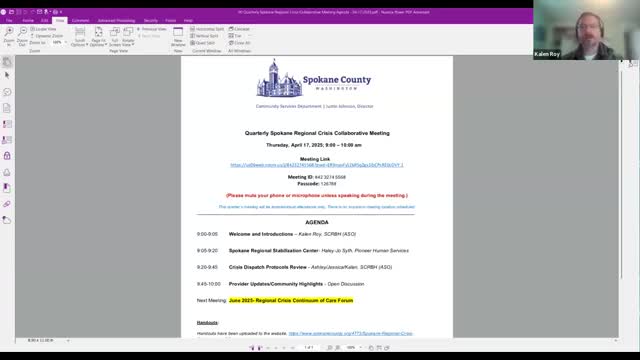Spokane region reviews dispatch protocols, plans crisis relief and sobering center co-located with stabilization campus
Get AI-powered insights, summaries, and transcripts
Subscribe
Summary
Spokane Regional BH ASO staff reviewed regional dispatch protocols designed to integrate 988, the regional crisis hotline (RCL), a mobile dispatch unit (MDU), and in-person crisis teams; Pioneer Human Services was named the selected provider for a planned crisis relief and sobering center targeted to open in early 2027.
Spokane Regional Behavioral Health ASO staff reviewed a draft set of regional dispatch protocols intended to coordinate 988, the regional crisis hotline (RCL), and a mobile dispatch unit that would triage and dispatch community crisis teams, Ashley Mingi, integrated behavioral health manager, said at the Spokane Regional Scribe Collaborative meeting.
Mingi said the protocols are being developed under recent state legislation that established responsibilities for Behavioral Health Administrative Service Organizations to coordinate regional crisis systems. She cited Senate Bill 6251 and House Bill 1134 as part of the statutory context for the review and said the protocols clarify roles for 988, the RCL, the mobile dispatch unit (MDU), mobile rapid response crisis teams (MRRCTs) and community-based crisis teams (CBCTs). “This dispatch protocols is really to take a look at our entire overview of our crisis response system and work out how those dispatching and how those parts are coming together,” Mingi said.
The Spokane RCL is currently operated by Frontier Behavioral Health, according to presenters. The MDU is being developed as a central hub to triage incoming calls and determine the most appropriate in-person response — mobile rapid response teams, designated crisis responders (DCRs) for involuntary evaluations, co-response units or 911 dispatch — based on acuity, availability and location. Jessica (last name not specified) and Caitlin (last name not specified) described the MDU’s role in coordinating referrals and daily crisis logs shared with managed care organizations to support follow-up for high utilizers.
Presenters reviewed definitions and workforce expectations in the draft protocols: MRRCTs should include clinicians and certified peer support specialists and meet response-time standards; CBCTs may be operated by fire, EMS, public agencies, nonprofits or health systems and can include medical personnel; DCRs have authority under state statute to conduct involuntary evaluations and hold individuals when criteria are met (transcript reference: “RCW 7105 and 7134”). Mingi noted that the endorsement process for MRRCTs and CBCTs is voluntary, that no endorsed teams currently exist in the Spokane region, and that endorsement carries potential performance payments if statutory time and staffing requirements are met. “We don’t have any endorsed teams at this point in time,” she said.
Transportation standards are a specific component of the WAC rules the protocols reference; endorsed teams must be capable of clinically appropriate voluntary transport to a behavioral health receiving center and meet equipment and safety standards, presenters said. Mingi described the region’s existing co-response programs, which pair Frontier clinicians with city or county law enforcement officers or Spokane Fire paramedics, and said those units will continue while the MDU and endorsement pathways are implemented.
As part of the crisis continuum discussion, Mingi announced that Pioneer Human Services was identified and selected via an RFP to provide a crisis relief and sobering center co-located on the stabilization center campus. The county has committed opioid settlement funds to the project, and planners aim to open the crisis relief and sobering center for adults 18 and older in early 2027. Mingi said the center will provide triage and 23-hour crisis observation, sobering services, minor wound care allowed by statute, walk-in access, and an alternative to emergency departments and jail for people in crisis. "We are very lucky in the Spokane region that we have vertical integration currently with Frontier being both the 988 and RCL provider," Mingi said, describing an operational advantage for the region’s transition to a centralized triage and dispatch model.
The draft dispatch protocols will be submitted to the Health Care Authority for approval and then provided to the Department of Health and the statewide 911 coordination office; protocol updates are expected no later than every three years, presenters said. Attendees were invited to comment on drafts and participate in continued planning; the next regional crisis continuum forum is planned for June.
